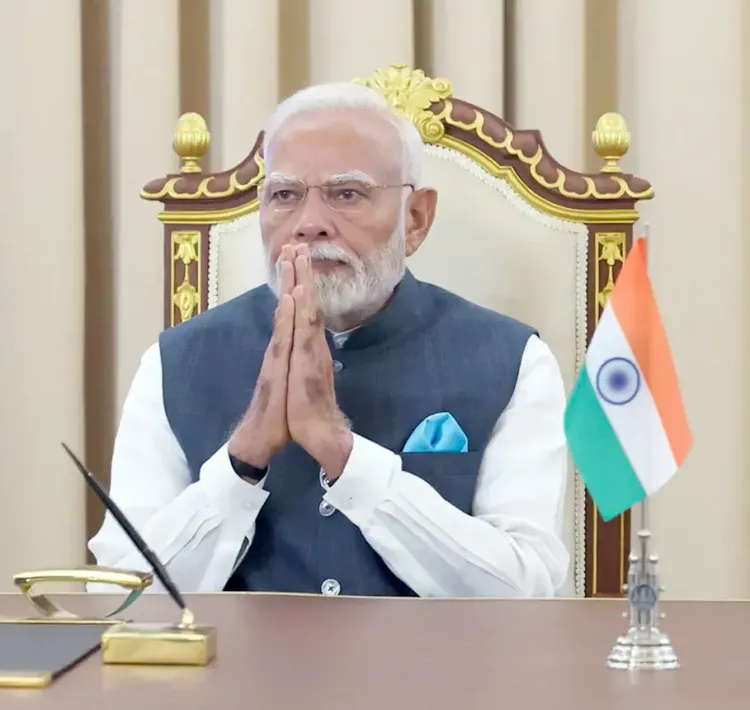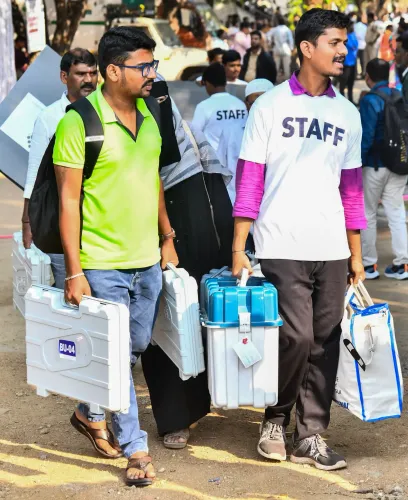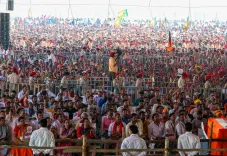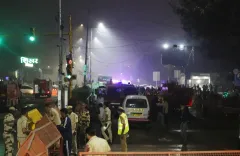How Prime Minister Modi Revitalised BIMSTEC into a Dynamic Forum

Synopsis
Key Takeaways
- Modi's policies revitalise BIMSTEC.
- India leads in multiple sectors.
- BIMSTEC adopts its charter in 2024.
- Focus on connectivity and regional stability.
- Significant events enhance engagement.
Bangkok, April 4 (NationPress) Prime Minister Narendra Modi's vision and policies are reinvigorating BIMSTEC, demonstrating India's leadership and influence over the group's trajectory while adhering to its Neighbourhood First and Act East policies, all of which align with its broader Indo-Pacific vision.
Currently, PM Modi is in Bangkok for the 6th Bay of BIMSTEC Summit, where he is anticipated to announce significant initiatives aimed at enhancing regional cooperation.
Despite its inception in 1997, BIMSTEC's advancements gained traction post-2016, thanks to PM Modi's pivotal initiative of inviting the group's leaders to a retreat in Goa during the BRICS Summit.
This initiative highlighted India's leadership in advancing the group's agenda.
PM Modi's Neighbourhood First policy, Act East policy, MAHASAGAR vision, and vision for the Indo-Pacific have indeed provided the necessary focus on the group, benefitting its member nations.
The BIMSTEC Summit acts as a vital platform for enhancing regional cooperation, uniting leaders from India, Bangladesh, Myanmar, Nepal, Sri Lanka, Thailand, and Bhutan.
The emphasis remains on improving collaboration in sectors such as connectivity, development, and regional economic integration while working towards shared growth and stability.
Over the years, India has consistently focused on strengthening BIMSTEC as a regional bloc. In 2019, PM Modi extended a special invitation to BIMSTEC leaders for his swearing-in ceremony, demonstrating India's commitment to enhancing ties within the grouping.
Recently, in May 2024, BIMSTEC adopted its charter, marking a significant milestone in institutionalising the organisation. This charter has endowed BIMSTEC with an international identity, defined its guiding principles, and established its institutional framework.
India has been instrumental in bolstering BIMSTEC's institutional foundation by appointing Indra Mani Pandey, an experienced diplomat, as the Secretary-General, thus infusing new vitality into the group's operations. Additionally, India has pledged $1 million to the BIMSTEC Secretariat to support capacity building and institutional development.
Furthering BIMSTEC's agenda, India hosted the BIMSTEC Foreign Ministers' Meeting in July 2024 and an informal gathering of BIMSTEC Foreign Ministers in New York during the UNGA in September 2024. These engagements have considerably broadened the group's operational scope.
Under India's leadership, BIMSTEC has been restructured into seven essential sectors, each led by a different member nation.
India leads the Security sector, focusing on establishing a robust legal framework to combat terrorism, violent extremism, and transnational crimes. Other sectors include Trade, Investment, and Development (led by Bangladesh); Environment and Climate Change (Bhutan); Agriculture and Food Security (Myanmar); People-to-People Connectivity (Nepal); Science, Technology, and Innovation (Sri Lanka); and Physical Connectivity (Thailand).
Acknowledging the significance of connectivity, India has made substantial strides in enhancing physical, digital, and energy linkages within BIMSTEC. It operates the BIMSTEC Energy Centre in Bengaluru, which plays a critical role in coordinating regional power grid interconnections under PM Modi's vision of 'One World, One Sun, One Grid'.
Moreover, India has facilitated disaster management collaboration, a vital aspect given the region's susceptibility to natural disasters.
A testament to this commitment was India's rapid response under 'Operation Brahma' to assist Myanmar following a devastating 7.7 magnitude earthquake.
India has also been key in enhancing BIMSTEC's contribution to global sustainability initiatives. It hosts the BIMSTEC Centre for Weather and Climate in Noida, which provides essential meteorological data for disaster preparedness.
Consistently prioritising people-to-people engagement, cultural exchanges, and youth empowerment within BIMSTEC, several major initiatives have been launched in recent months, underscoring India's proactive role in the group. These include the BIMSTEC-India Marine Research Network, inaugurated in February 2024, and the BIMSTEC Aquatic Championship, held in New Delhi in the same month.
In August 2024, the BIMSTEC Business Summit took place in Delhi, while the BIMSTEC Cultural Troupe participated in the Bali Jatra festival in Cuttack in November 2024.
Further events such as the BIMSTEC Pavilion at the Surajkund Mela in February 2025, the BIMSTEC Youth Summit in Ahmedabad, and the BIMSTEC Youth-led Climate Change Conference in Delhi highlight the increasing engagement across diverse sectors.
As PM Modi attends the 6th BIMSTEC Summit in Bangkok, his vision for the organisation, initially articulated at the Goa Retreat in 2016, continues to influence its future. Two significant decisions made in Goa are being formally adopted at this Summit: the BIMSTEC Vision 2030 document and the BIMSTEC Eminent Persons Group report.
With India leading the way, BIMSTEC has transformed into a dynamic and action-oriented coalition, poised to play an even more significant role in regional cooperation and integration in the forthcoming years.









